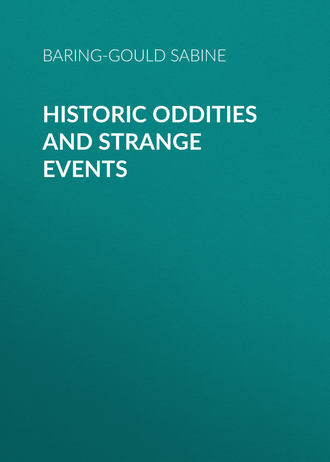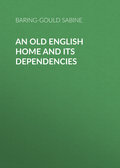
Baring-Gould Sabine
Historic Oddities and Strange Events
"Scandalous, they are not," answered Fessler.
"Impius, cum in profundum venerit, contemnit," roared the friar. "They are not only scandalous, but impious. Look at this letter on platonic love. Is that a fit letter for such as you to write to a lady?"
In consequence of these letters, and the MS. of the pamphlet being found upon him, Fessler was denounced to the Consistorial Court of the Archbishop. He was summoned before it at the beginning of August, when he was forced to admit he had been wont to kiss the lady to whom he wrote on platonic love, and the Consistory suspended him from the exercise of his priestly functions for a month.
"I and the Lector returned to the convent silent, as if strangers. When we arrived, the friars were at table. I do not know how I got to my place; but after I had drunk my goblet of wine, all was clearer about me. I seemed to hear the voice of Horace calling to me from heaven, Perfer et obdura! and in a moment my self-respect revived, and I looked with scorn on the seventy friars hungrily eating their dinner."
Of his own despicable conduct, that he had richly deserved his punishment, Fessler never seems to have arrived at the perception. He was, indeed, a very pitiful creature, arousing disgust and contempt in a well-ordered mind; and his Memoirs only deserve notice because of the curious insight they afford into the inner life of convents, and because he was the means of bringing great scandals to light, and in assisting Joseph II. in his work of reform.
At the beginning of September, 1782, Fessler was the means of bringing a fresh scandal before the eyes of the Emperor. During the preceding year, a saddler in Schwächat had lost his wife, and was left, not only a widower, but childless. His niece now kept house for him, and was much afraid lest her uncle should marry again, and that thus she should not become his heir. She consulted a Capuchin, Father Brictius. Fessler had been in the Schwächat convent, and knew the man. Soon after, the niece assured her uncle that the ghost of her aunt had appeared to her, and told her she was suffering in Purgatory. For her release, she must have ten masses said, and some wax candles burnt. The saddler was content to have his old woman "laid" at this price. But, after the tenth mass, the niece declared she had seen her aunt again, and that the spirit had appeared to her in the presence of Father Brictius, and told her, that what troubled her most of all was the suspicion she was under, that her husband purposed marrying again; and she assured him, that were he so to do, he would lose his soul, in token whereof, she laid her hand on the cover of the niece's prayer-book, and left the impression burnt into it.
Father Brictius carried the scorched book all round the neighbourhood, the marks of thumb and five fingers were clearly to be seen, burnt into the wooden cover. Great was the excitement, and on all sides masses for souls were in demand. Some foolish pastors even preached on the marvel.
It happened that a Viennese boy was apprenticed to a tinker at Schwächat; and the boy came home every Saturday evening, to spend the day with his parents, at Vienna. He generally brought Fessler some little presents or messages from his friends at Schwächat. One day, the boy complained to Fessler that he had been severely beaten by his master. On being asked the reason, he replied, that he had been engaged with the tinker making an iron hand, and that he had spoiled it. Shortly after this, the rumour of the miraculous hand laid on the prayer-book, reached the convent. Fessler put the circumstances together, and suspected he was on the track of a fraud. He went at once to one of the ministers of the Emperor, and told him what he knew.
An imperial commission was issued, the tinker, the saddler's niece, and Father Brictius, were arrested, cross-questioned, and finally, confessed the trick. The tinker was sent to prison for some months, the woman, for some weeks, and the Franciscan was first imprisoned, and then banished the country. An account of the fraud was issued, by Government authority, and every parish priest was ordered to read it to his parishioners from the pulpit.
The Capuchins at Vienna, after this, were more impatient than before to send Fessler to Hungary, and he was forced to appeal to the Emperor to prevent his removal.
Suddenly, quite unexpectedly, in the beginning of October – seven months after Fessler had sent the Emperor an account of the prison in the convent, and when he despaired of notice being taken of it – some imperial commissioners visited the convent, and demanded in the name of the Emperor to be shown all over it. At the head of the Commission was Hägelin, to whom Fessler had told his suspicions about the iron hand.
The commissioners visited all the cells, and the infirmary, then asked the Guardian thrice on his honour, and in the name of the Emperor, whether there was a prison in the convent. Thrice the Guardian replied that there was not. "Let us now visit the kitchen," said Hägelin, and in spite of the protests and excuses of the Guardian, he insisted on being taken there. Beyond the kitchen was the wash-house. The commissioners went further, and found a small locked door. They insisted on its being opened. Then the Guardian turned pale and nearly fainted. The door was thrown open, the cells were unlocked, and the lay brothers ordered to bring the prisoners into the refectory. There the commissioners remained alone with the unfortunates to take down their depositions. It was found that three, Fathers Florentine, and Paternus, and the lay brother, Nemesian, were out of their minds. The "lion-ward" was summoned to answer for them. From his account, it transpired that Nemesian had gone out of his mind through religious enthusiasm; he was aged seventy-one, and had been fifty years in the dungeon. Father Florentine was aged seventy-three, he had been in confinement for forty-two years for boxing the Guardian's ears in a fit of temper. Father Paternus was locked up because he used to leave his convent without permission, and when rebuked would not give up his independent conduct. He had been fifteen years in prison. His confinement had bereft him of his senses. As the remaining two were in full possession of their faculties, the "lion-ward" was now dismissed. The lay brother Barnabas said he had been a shopkeeper's servant in Vienna, he had fallen in love with his master's daughter. As his master refused to have him as his son-in-law, out of despair he had gone into the Capuchin Order. During his noviciate, the master died; the master of the novices stopped the letter informing him of this, and he took the vows, to discover, when too late, that the girl loved him, and was ready to take him. In his mad rage, he flung his rosary at the feet of the Guardian, declaring he would never confess to, or receive the communion from the hands of a father of this accursed Order. He had been nine years in prison, and was thirty-eight years old.
Father Thuribius had been caught reading Wieland, Gellert, Rabener, &c.; they had been taken from him. He got hold of other copies, they were taken away a second time. A third time he procured them, and when discovered, fought with his fists for their retention. He had been repeatedly given the cat o' nine tails, and had been locked up five months and ten days. His age was twenty-eight.
The commissioners at once suspended the Provincial and the Guardian till further notice, and the five unfortunates were handed over to the care of the Brothers of Charity.
That same day, throughout the entire monarchy, every monastery and nunnery was visited by imperial commissioners.
At the same time, the Emperor Joseph issued an order that Fessler was on no account to be allowed to leave Vienna, and that he took him under his imperial protection against all the devices of his monastic enemies.
"Now came the sentence on the Guardian and the Provincial from the Emperor. They were more severely punished than perhaps they really deserved. I felt for their sufferings more keenly, because I was well aware that I had been moved to report against them by any other motive rather than humanity; and even the consequences of my revelation, the setting at liberty of a not inconsiderable number of unfortunate monks and nuns throughout the Austrian Empire, could not set my conscience at rest. Only the orders made by the Emperor rendering it impossible to repeat such abuses, brought me any satisfaction. The monastic prisons were everywhere destroyed. Transgression of rules was henceforth to be punished only by short periods of seclusion, and cases of insanity were to be sent to the Brothers of Charity, who managed the asylums."
If Joseph II. had but possessed commonsense as well as enthusiasm, he would have left his mark deeper on his country than he did.
Fessler laid before him the schedule of studies in the Franciscan Convents. Joseph then issued an order (6th April, 1782), absolutely prohibiting the course of studies in the cloisters. When Fessler saw that the Guardian of his convent was transgressing the decree, he appealed against him to the Emperor, and had him dismissed. Next year Joseph required all the students of the Capuchin Order to enter the seminaries, and pass thence through the Universities. But, unfortunately, Joseph had taken a step to alienate from him the bishops and secular clergy, as well as the monks and friars. He arbitrarily closed all the diocesan seminaries, and created seminaries of his own for the candidates for Orders, to which he appointed the professors, thus entirely removing the education of the clergy from the hands of the Church. When the Bishop of Goritz expressed his dissatisfaction, Joseph suppressed his see and banished him. The professors he appointed to the universities, to the chairs which were attended by candidates for Orders, were in many cases free-thinkers and rationalists. The professor of Biblical Exegesis at Vienna was an ex-Jesuit, Monsperger, "His religious system," says Fessler, who attended his course, "was simply this, – a wise enjoyment of life, submission to the inevitable, and prudence of conduct. That was all. He had no other idea of Church than a reciprocal bond of rights and duties. In his lectures he whittled all the supernatural out of the Old Testament, and taught his pupils to regard the book as a collection of myths, romance, and contradictions. His lectures brought me back from my trifling with Jansenism to the point I had been at four years before under the teaching of Hobbes, Tindal, and the Wolfenbüttel Fragments. I resolved to doubt everything supernatural and divine, without actually denying such thing. – Strange! I resolved to disbelieve, when I never had believed."
On Feb. 6th, 1784, he received the Emperor's appointment to the professorships of Biblical Exegesis and Oriental languages in the University of Lemberg. On the 20th Feb., on the eve of starting for Lemberg, for ever to cast off the hated habit of S. Francis, and to shake off, as much as he dare, the trammels of the priesthood, Fessler was in his cell at midnight, counting the money he had received for his journey. "To the right of me, on the table was a dagger, given me as a parting present by the court secretary, Grossinger. I was thinking of retiring to rest, when my cell door was burst open, and in rushed Father Sergius, a great meat-knife in his hand, shouting, Moriere hœretice! he struck at my breast. In an instant I seized my dagger, parried the blow, and wounded my assailant in the hand. He let the knife fall and ran away. I roused the Guardian, told him what had occurred, and advised what was to be done. Sergius, armed with two similar knives, had locked himself into his cell. At the command of the Guardian six lay-brothers burst open the door, and beat the knives from his hands with sticks, then dragged him off to the punishment-cell, where they placed him under watch. Next morning I went with the Guardian, as I had advised, to the president of the Spiritual Commission, the Baron von Kresel, to inform him that Father Sergius had gone raving mad, and to ask that he might be committed to the custody of the Brothers of Mercy. This was at once granted; and I left the Guardian to instruct the fanatic how to comport himself in the hospital as a lunatic, so as not to bring his superiors into further difficulties."
The first acquaintance Fessler made in Lemberg, was a renegade Franciscan friar, who had been appointed Professor of Physic, "He was a man of unbounded ambition and avarice, a political fanatic, and a complete atheist." Joseph afterwards appointed this man to be mitred abbot of Zazvár. He died on the scaffold in 1795, executed for high treason.
The seminarists of the Catholic and of the Uniat Churches as well as the pupils from the religious Orders were obliged to attend Fessler's lectures. These were on the lines of these of Monsperger. Some of the clergy in charge of the Seminarists were so uneasy at Fessler's teaching that they stood up at his lectures and disputed his assertions; but Fessler boasts that after a couple of months he got the young men round to his views, and they groaned, hooted and stamped down the remonstrants. He published at this time two works, Institutiones linguarum orientalium, and a Hebrew anthology for the use of the students. In the latter he laid down certain canons for the interpretation of the Old Testament, by means of which everything miraculous might be explained away.
It was really intolerable that the candidates for orders should be forcibly taught to disbelieve everything their Church required them to hold. In his inspection of the monasteries, in the suppression of many, Joseph acted with justice, and the conscience of the people approved, but in this matter of the education of the clergy he violated the principles of common justice, and the consequence was such wide-spread irritation, that Joseph for a moment seemed inclined to give way. That Joseph knew the rationalism of Fessler is certain. The latter gives a conversation he had with the Emperor, in which they discussed the "Ruah," the Spirit of God, which moved on the face of the waters, as said in the first chapter of Genesis. Fessler told him that he considered "the expression to be a Hebrew superlative, and to mean no more than that a violent gale was blowing. Possibly," he added, "Moses may have thought of the Schiva in the Hindoo Trimurti; for he was reared in all the wisdom of the Egyptians, who were an Ethiopic race, which was in turn an Indian colony." Dr. Fessler's Ethnology was faulty, whatever may be thought of his Theology.
After having given this explanation to the Emperor, Fessler boldly asked him for a bishopric – he who loathed his priesthood and disbelieved in revealed religion!
Joseph did not give him a mitre, but made him Professor of Doctrinal Theology and Catholic Polemics as well as of Biblical Exegesis. This did not satisfy the ambitious soul of Fessler, he was bent on a mitre. He waited with growing impatience. He sent his books to Joseph. He did his utmost to force himself into his notice. But the desired mitre did not come.
Fessler complains that scandalous stories circulated about him whilst at Lemberg, and these possibly may have reached the imperial ears. He asserts, and no doubt with perfect truth, that these were unfounded. He had made himself bitter enemies, and they would not scruple to defame him. He boasts that at Lemberg he contracted no Platonic alliances; he had no attachements de cœur there at all.
The Emperor seemed to have forgotten him, to have cast aside his useful tool. Filled with the bitterness of defeated ambition, in 1788 he wrote a drama, entitled James II., a covert attack on his protector, Joseph II., whom he represented as falling away in his enthusiasm for reform, and succumbing to the gathering hostility of Obscurantists and Jesuits.
This was not the case, but Joseph was in trouble with his refractory subjects in the Low Countries, who would not have his seminaries and professors, who subscribed for the support of the ousted teachers, and rioted at the introduction of the new professors to the University of Louvain.
The play was put into rehearsal, but the police interfered, and it was forbidden. Fessler either feared or was warned that he was about to be arrested, and he escaped over the frontier into Prussian Silesia. Joseph II. died in 1790, broken in spirit by his failures.
Fessler, after his escape from Austria, became a salaried reader and secretary to the Count of Carolath, whose wife was a princess of Saxe-Meiningen.
After a while he married a young woman of the middle class; he seems to have doubted whether they would be happy together, after he had proposed, accordingly he wrote her a long epistle, in the most pedantic and dictorial style, informing her of what his requirements were, and warning her to withdraw from the contemplated union, if she were not sure she would come up to the level of the perfect wife. The poor creature no doubt wondered at the marvellous love letter, but had no hesitation in saying she would do her duty up to her lights. The result was not happy. They led together a cat-and-dog life for ten years. She was a homely person without intellectual parts, and he was essentially a book-worm. He admits that he did not shine in society, and leaves it to be understood that the loss was on the side of inappreciative society, but we can not help suspecting that he was opinionated, sour, and uncouth. All these qualities were intensified in the narrow circle of home. After ten years of misery he divorced his wife on the ground of mutual incompatibility. For a livelihood he took up Freemasonry, and went about founding lodges. There were three rogues at that period who worked Freemasonry for their own ends, the Darmstadt Court Chaplain, Starck, a Baron von Hundt, and a certain Becker, who called himself Johnson, and pretended to be a delegate from the mysterious, unknown head of the Society in Aberdeen. They called themselves Masons of the Strict Observance, but were mere swindlers.
After a while, Freemasonry lost its attractions for Fessler, probably it ceased to pay, and then he left Breslau, and wandered into Prussia. He wrote a novel called "Marcus Aurelius," glorifying that emperor, for whom he entertained great veneration, and did other literary work, which brought him in a little money. Then he married again, a young, beautiful and gifted woman, with a small property. He was very happy in his choice, but less happy in the speculation in which he invested her money and that of her sisters. It failed, and they were reduced to extreme poverty. What became of the sisters we do not know. Fessler with his wife and children went into Russia, and sponged for some time on the Moravian Brothers, who treated him with great kindness, and lent him money, "Which," he says, in his autobiography, "I have not yet been able to pay back altogether."
He lost some of his children. Distress, pecuniary embarrassments, and sickness, softened his heart, and perhaps with that was combined a perception that if he could get a pastorate he would be provided for;22 this led to a conversion, which looks very much as if it were copied from the famous conversion of St. Augustine. It possibly was, to some extent, sincere; he recovered faith in God, and joined the Lutheran community. Then he had his case and attainments brought under the notice of the Czar, who was, at the time, as Fessler probably knew, engaged in a scheme for organising the Lutheran bodies in Finland into a Church under Episcopal government. He chose Fessler to be bishop of Saratow, and had him consecrated by the Swedish bishops, "Who," says Fessler, "like the Anglican bishops, have preserved the Apostolic succession." He makes much of this point, a curious instance of the revival in his mind of old ideas imbibed in his time of Catholicity.. According to his own account, he was a bishop quite on the Apostolic model, and worked very hard to bring his diocese into order. His ordination was in 1820. In 1833, the Saratow consistory was dissolved, and he retired to St. Petersburg, where he was appointed general superintendent of the Lutheran community in the capital. He married a third time, but says very little of the last wife. He concludes with this estimate of his own character, which is hardly that at which a reader of his autobiography would arrive. "Earnestness and cheerfulness, rapid decision, and unbending determination, manly firmness and childlike trueheartedness – these are the ever recurring fundamental characteristics of my nature. Add to these a gentle mysticism, to surround the others with colour and unite them in harmony. Sometimes it may be that dissonances occur, it may be true that occasionally I thunder with powerful lungs in my house, as if I were about to wreck and shatter everything, but that is called forth only by what is wrong. In my inmost being calm, peace, and untroubled cheerfulness reign supreme. Discontent, wrath, venom and gall, have not embittered one moment of my life."23







